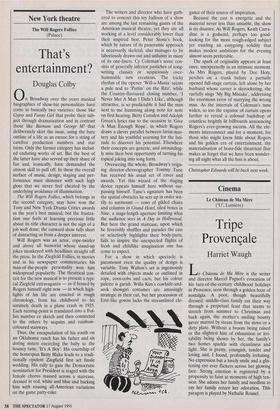New York theatre
The Will Rogers Follies (Palace)
That's entertainment?
Douglas Colby
0 n Broadway over the years musical biographies of show-biz personalities have come in basically two varieties: those like Gypsy and Funny Girl that probe their sub- ject through dramatisation and in contrast those like Barnum and George M! that deliberately skirt the issue, using the bare outline of a life as an excuse for a string of carefree production numbers and star turns. Only the former category has includ- ed enduring works of art. But the best of the latter have also served up their share of fun and, ironically, have demanded the utmost skill to pull off. In these the overall surface of music, design, staging and per- formance must shimmer with such high gloss that we never feel cheated by the underlying avoidance of illumination.
The Will Rogers Follies, which belongs in the second category, may have won the Tony and New York Drama Critics awards as the year's best musical, but the frustra- tion one feels at learning precious little about its title character is not the sign of a job well done; the outward show falls short of distracting us from a deeper interest.
Will Rogers was an actor, rope-twirler and above all humorist whose stand-up jokes monkeyed with headlines straight off the press. In the Ziegfeld Follies, in movies and in his newspaper commentaries his man-of-the-people personality won him widespread popularity. The theatrical con- ceit for the new musical is to present a typi- cal Ziegfeld extravaganza — as if hosted by Rogers himself right now — in which high- lights of his life are enacted in rough chronology, from his childhood to his untimely death in a plane crash in 1935. Each turning-point is translated into a Fol- lies number or sketch and then connected to the others by sequins and rainbow- coloured stairways.
Thus, the encapsulation of his youth on an Oklahoma ranch has his father and six doting sisters encircling the baby to the bouncy tune, 'It's A Boy'. His courtship of the homespun Betty Blake leads to a tradi- tionally opulent Ziegfield first act finale wedding. His rally to gain the Democratic nomination for President is staged with the female chorus massed across a staircase, dressed in red, white and blue and backing him with rousing all-American variations on the game patty-cake. The writers and director who have gath- ered to concoct this toy balloon of a show are among the last remaining giants of the American musical theatre, yet they are all working at a level considerably lower than their inspired best. Peter Stone's book, which by nature of its panoramic approach is necessarily skeletal, also manages to be laboriously drawn-out and unfunny in many of its one-liners. Cy Coleman's score con- sists of generally inferior pastiches of song- writing classics or suspiciously over- hummable new creations. The tricky rhythm of the opener `Will-a-Mania' seems a pale nod to 'Puffin' on the Ritz', while the Country-flavoured closing number, Never Met A Man I Didn't Like', although attractive, is so predictable it had the man next to me humming along note for note on first hearing. Betty Comden and Adolph Green's lyrics rise to the occasion in 'Give A Man Enough Rope', in which Rogers draws a clever parallel between lariat-mas- tery and his youthful yearning for the lati- tude to discover his potential. Elsewhere their concepts are generic, and astounding- ly miss their best opportunity of turning his topical joking into song form.
Overseeing the whole, Broadway's reign- ing director-choreographer Tommy Tune has received his usual set of raves and awards. Yet this wizard of the staging device repeats himself here without sur- passing himself. Tune's signature has been the spatial obstacles he sets up in order wit- tily to surmount — rows of gilded chairs and columns in Grand Hotel, tiled boxes in Nine, a stage-length aperture limiting what the audience sees in A Day in Hollywood. But here the grand staircase, upon which he feverishly shuffles and parades the cast or selectively highlights their body-parts, fails to inspire the unexpected flights of fresh and childlike imagination one has come to expect.
For a show in which spectacle is paramount even the quality of design is variable. Tony Walton's set is ingeniously detailed with objects made or outlined in rope, corn-cobs and cacti, but his colour palette is garish. Willa Kim's cowhide-and- seek showgirl costumes are amusingly strategic in their cut, but her procession of Erte-like gowns lacks the streamlined ele-
gance of their source of inspiration.
Because the cast is energetic and the material never less than amiable, the show is no disaster. As Will Rogers, Keith Carra- dine is a godsend, perhaps too good- looking for the more rough-edged subject yet exuding an easygoing solidity that makes modest ambitions for the evening almost seem preferable.
The spark of originality appears at least once, unexpectedly in an intimate moment. As Mrs Rogers, played by Dee Hoty, perches on a trunk before a partially opened full-stage curtain, left alone by her husband whose career is skyrocketing, she ruefully sings 'My Big Mistake', addressing the enormous error of marrying the wrong man. As the intervals of Coleman's tune widen, so too the expanse of curtain opens further to reveal a colossal backdrop of countless brightly lit billboards announcing Rogers's ever-growing success. All the ele- ments interconnect and for a moment, for those who might know little about Rogers and his golden era of entertainment, the materialisation of bona-fide theatrical flair makes us forget that we have been wonder- ing all night what all the fuss is about.


















































 Previous page
Previous page